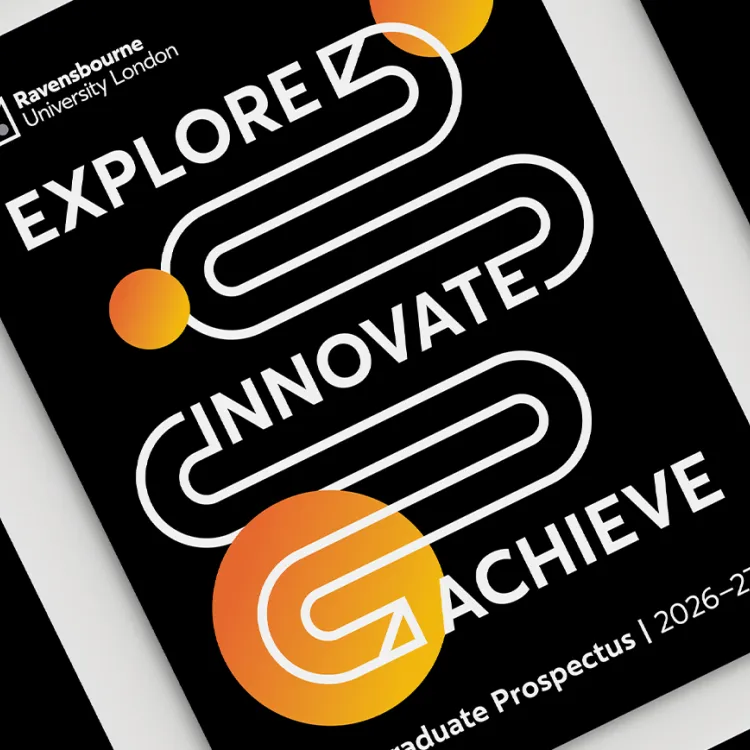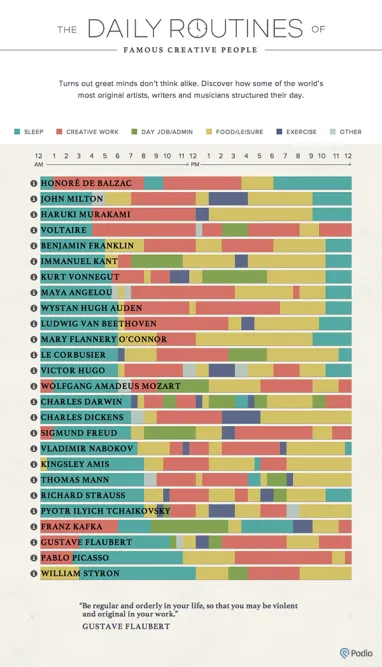Wellbeing series: Is there such thing as the perfect routine?

Article by: Gaynor Orvis
Publication date:Over the last few months, all of us have had to make the shift to remote learning and working. With this newfound freedom over where and when to work, many of us have questioned whether our old habits are still serving us. Here Copywriter Gaynor Orvis discusses whether there is such a thing as a perfect routine, and borrows inspiration from famous creatives to ask: is the secret to success found in how we structure our day?
Many of us don’t much miss the drudgery of our work commute and have by now fully embraced the tracksuit life. For me, however, there is something about the structure of the old working day that helped to keep me in check and stopped my mind from wandering too far.
Working from home has given me more control over my routine. And this has required me to build a new level of self-discipline that I didn’t have before. When I was still working in the office I had more regimented times for work, exercise and rest. But this, along with almost everything else this year, has been disrupted. For the most part, I enjoy the extra time that not commuting has given me, but I must admit that another part of me craves that structure.
Looking for creative inspiration
To try to make adjustments to my new routine, I have been looking to some of the most celebrated creative men and women for inspiration. Anyone who pursues creative projects, either for work or pleasure, will have at some point been fascinated by the routines of the world’s most brilliant creative minds; the artists, poets, writers and influential thinkers that have inspired generations with their work.
Take, for example, the Japanese writer Haruki Murakami. He has a famously rigid routine which involves him waking up each day at 4am, working for nine hours straight and finding the time to run a 10k every day. Commenting on this he said, “The repetition itself becomes the important thing; it’s a form of mesmerism. I mesmerise myself to reach a deeper state of mind.”
I must admit I have pondered slightly narcissistically: what if I woke up at 4am every day and carried out my work duties with this level of precision, would I be an inch closer to genius? Chances are probably not, but could the secret to our personal success be found in the way in which we structure our day?
Secrets to routine success
Creativity is something that ebbs and flows and all too often seems to abandon us before a fast approaching deadline or creative meeting. Amid all the mundane parts of everyday life; the meetings and responsibilities, there are tiny glimpses of pure creativity. For many of us, though, these moments are fleeting and unreliable. Is there a way that through repetition and discipline, we can harness this potential more frequently and come to depend on it?
Take a look at the Infographic below, which shows the routines of creative geniuses from all walks of life; from American poet Maya Angelou, to French architect Le Corbusier and from Mozart to Pablo Picasso. Here you can see that interestingly, it turns out that great minds don’t think all that much alike.
https://podio.com/site/creative-routines
Filter the different categories by toggling on or off, and hover over the colored bars to learn more about the daily routines.
hide title
Night owl or early riser?
We often categorise people as either being ‘morning people’ or more of a ‘night owl’. It is unclear whether one is objectively better than the other, and we can see from the infographic that our geniuses here differed drastically in their sleep patterns. Whereas French poet Honoré de Balzac was off to bed at 6pm, to rise at the ungodly hour of 1am, Pablo Picasso would fall asleep at 3am to wake up at a leisurely 11am.
If you are committed to joining the ranks of the early risers, then the trick is consistency. Once your body has got used to the shock of it, then your circadian rhythm, the internal process that regulates your sleep and wake cycle, will adjust just fine. It will become like second nature.
Find a schedule that works for you
When it comes to finding a schedule, we can see that ritual-wise these geniuses were miles apart too. Whereas Maya Angelou worked solidly from 7am till 3pm, Mozart had several splashes of inspiration lasting anywhere from an hour to three throughout the day.
This graph reinforces the fact that there is no right or wrong time to be creative, the important thing however is finding what works for you. Naturally, some days you will need to stray from your routine. Being flexible enough to adapt to change is important, too.
A routine is not supposed to intimidate you, and if it does, then maybe it is a bit too ambitious. However, a well-thought out routine can also provide a safety net. It protects from the existential terror that we can often feel with no structure at all and is something that over time we can relax into.
The fact of the matter is, working from home is no walk in the park. Alongside trying to adjust to an alternative way of working, we are coping with feelings of isolation too. We are social creatures that crave human interaction, but we are also problem solvers and highly resilient. Though times might be tough, we continue to discover imaginative ways to not only survive, but thrive.




